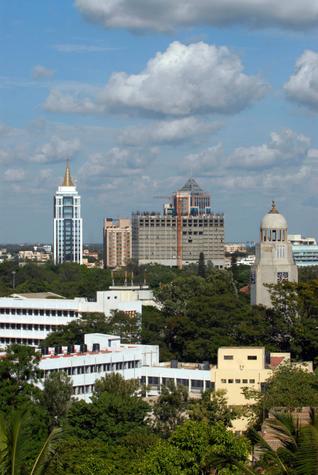 BANGALORE, July 25;A debate has broken out among the city’s urban planning experts over what Bangalore, particularly its central business district (CBD), should look like in the year 2020. Can the CBD take more load? Should there be greater infrastructure investment in this part of the city or has it reached saturation? Should there be more construction or less? Should the buildings in the city be allowed to get taller?
BANGALORE, July 25;A debate has broken out among the city’s urban planning experts over what Bangalore, particularly its central business district (CBD), should look like in the year 2020. Can the CBD take more load? Should there be greater infrastructure investment in this part of the city or has it reached saturation? Should there be more construction or less? Should the buildings in the city be allowed to get taller?
Although these are questions facing urban planners in all major cities of the world, what has triggered the debate in the city is a key recommendation in the report of the Karnataka Information and Communication Technology Group 2020. (ICT Report 2020 from here on.)
The report, which was submitted by the ICT to the previous government in January this year, has been resubmitted to the Congress government recently.
What is premium FSI?
The contentious recommendation: introduce a category called premium floor space index (FSI). It will allow builders to construct beyond the numbers of floors permitted by law. The catch is that they will have to pay a premium for the extra floors built.
The city has been divided into three zones in the ICT proposal. The premium will range from Rs. 2,500 per sq ft in Zone A to Rs. 640 per sq ft in Zone C for commercial buildings and Rs. 2,000 to Rs. 512 for residential buildings.
The group, comprising industry captains and urban planning experts, was created by the previous government to prepare a roadmap for the development of physical and intellectual infrastructure that would make Bangalore a major global investment destination.
At the forefront of those opposed to the recommendation is Rajya Sabha MP Rajeev Chandrasekhar. In a recent letter to Chief Minister Siddaramaiah, he accused the ICT group of promoting the interests of the real estate and builder lobbies. He said the report is “an attempt by some builders and [the] real estate lobby to significantly influence the development plans of our city”.
It is Mr. Chandrasekhar’s case that clearance for taller buildings in the heart of the city will put additional burden on the already stretched common infrastructure such as roads and water supply.
The nitty-gritty
Urban planner and Lok Satta Party leader Ashwin Mahesh is a little more circumspect in his criticism. He says that he is categorically opposed to any policy that allows people to pay money and violate the law. However, he is not principally opposed to higher FSI. “There should be a cap on the number of floors that can be constructed in each zone. The city administration should charge a premium from those who want to hit the ceiling of that cap.”
But before any of that happens, Mr. Mahesh says that the city’s infrastructure such as roads, public transport, pavements and parking facilities have to be upgraded to bear the load of higher buildings and larger populations. “And none of this should be pushed through without the statutory process of consultation involving elected urban local bodies. Thanks to the State government’s reluctance to devolve power, we still do not have a Metropolitan Planning Committee,” he says.
